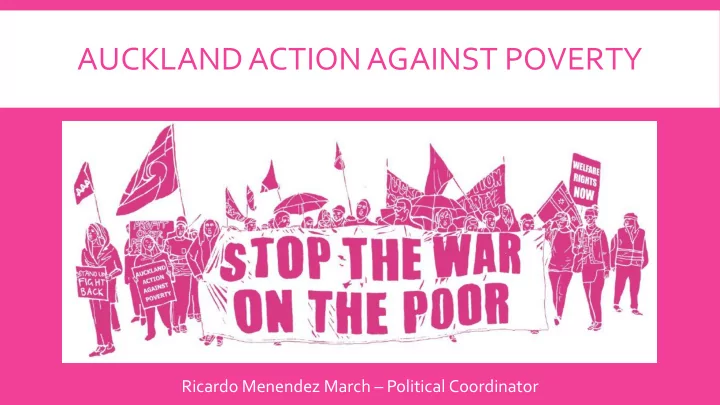

AUCKLAND ACTION AGAINST POVERTY Ricardo Menendez March – Political Coordinator
WHO WE ARE. WHAT WE DO. AAAP is a direct action, advocacy and education group who are standing up, speaking out and fighting back against neoliberal welfare reforms. Established in 2010 No government funding Use advocacy, media, educations and direct action to challenge the systemic failures of punitive welfare reform.
ADVOCACY & ADVOCACY TRAINING Using competent solidarity as a model This year AAAP advocates will work with over 5000 people Working from our office in Onehunga and in Henderson, Clendon and Manurewa 130 people seen at Clendon and Manurewa on Thursdays and Fridays (replacing 3-day Benefit Impacts) Leads to numerous media stories about the actions of Work and Income and Housing New Zealand Leads to campaign and protest action work AAAP holds trainings for community groups and potential volunteers.
WHY WE SHOULD ABOLISH THE MARRIAGE BENEFIT RATE Everyone deserves to maintain their financial independence, regardless of their relationship status. The Social Security Act determines that the Ministry of Social Development may assign or reduce an individual’s benefit based on the belief that the individual has entered into a relationship “in the nature of marriage.” The benefit levels for an individual are significantly higher than the rates per person for those individuals on a benefit who are married, in a civil union, or in a de facto relationship, which puts an unnecessary strain on new couples and discourages relationships in the first place.
WHY WE SHOULD ABOLISH THE MARRIAGE BENEFIT RATE The Social Security Act does not clearly define what constitutes a relationship. This means that the Ministry has had to create arbitrary policies and guidelines based on previous Social Security Appeal Authority cases and outdated values. Currently there are 3 key criteria used to determine whether someone is in a ‘marriage type relationship’ 1. Cohabitation 2. Financial Interdependence 3. Emotional Commitment.
WHY WE SHOULD ABOLISH THE MARRIAGE BENEFIT RATE An OIA report from The Ministry of Social Development shows that, in the year to March 2017, over 11,000 calls were made to a dedicated hot line enabling people to anonymously accuse beneficiaries of benefit fraud. As a result, almost 6,000 benefit fraud investigations were made during that year, with over 3,000 regarding allegations of the beneficiary being in a ‘relationship in the nature of marriage’. Out of the investigations completed, overpayments were established in 1,800 investigations, with only 431 successful prosecutions.
WHY WE SHOULD ABOLISH THE MARRIAGE BENEFIT RATE Benefit Fraud Investigation meetings can take over 8 hours. There are no consequences for people dobbing in beneficiaries and making outlandish claims. There continues to be excessive data gathering from third parties (banks, DHBs, neighbours) in order to try and construe a picture that proves the person is in a marriage type relationship. The investigators pry into people’s sex life throughout the course of interviews and data gathering. Benefit Fraud investigations are expensive, dehumanising, and poorly conducted.
WHY WE SHOULD ABOLISH THE MARRIAGE BENEFIT RATE The end result of the legislation (why it needs to change): Modern relationships do not function as the government assumes they do; often times partners are completely financially independent of one another, and even those who are married or in a civil union often maintain their own jobs and bank accounts. This policy disincentives relationships by pressuring individuals to remain single in order to keep their current benefit rate, even if their partner is on a benefit, since two single benefit rates are significantly higher than one marriage rate. It is especially difficult for single parents supporting their children to enter into a relationship. If an individual and their partner have a combined annual income greater than $43,422 or hold assets in excess of $1,825, the individual is not entitled to any benefit at all. If the majority of this income comes from the partner, the individual is forced to depend financially on this person.
WHY WE SHOULD ABOLISH THE MARRIAGE BENEFIT RATE The end result of the legislation (why it needs to change): For those deemed by the government to be in a de facto relationship, financial independence is not enough on its own to justify the denial of a de facto relationship to MSD, as its interpretation of financial interdependence includes a sense of at least willingness to support the other person if that person cannot support themselves. Forcing individuals in a relationship to be financially dependent on their partner is dangerous and irresponsible on the part of the government, as it can trigger situations of domestic abuse or violence. Those in the disabled community deserve to retain control of their needs, health, and financial independence, regardless of their relationship status or living situation.
Recommend
More recommend